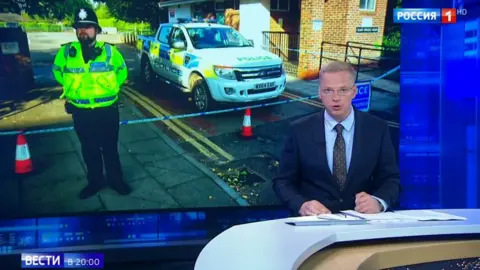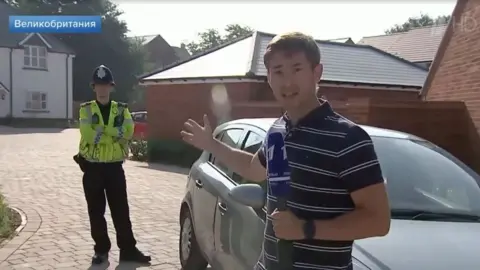Amesbury poisoning: Russia media say UK spoiling World Cup
 Rossiya 1
Rossiya 1As after the poisoning of former spy Sergei Skripal in Salisbury in March, Russia's pro-Kremlin media have responded to the latest incident in Amesbury by spreading conspiracy theories apparently designed to deflect blame from Russia
The overall gist of primetime state TV news reports is that Amesbury poisoning could be a ploy to tarnish Russia's image in the West, particularly at a time when - they argue - it has been boosted by its hosting of the World Cup.
They also point out that it is a time of intense diplomatic activity involving US President Donald Trump in the run-up to his meeting with President Vladimir Putin in Helsinki.
"Coincidentally or not," a correspondent on state-run Rossiya 1 said, the poisoning in Amesbury took place "right before" a Nato summit and Donald Trump's visit to Britain.
Over on Channel One, a London-based Russian pundit said the incident had come as Theresa May's cabinet was facing "huge problems".
In addition to a "failed" Brexit and a "failed" economy, she is dealing with the uncertainty over Mr Trump's visit and the Nato summit, he said.
He added that all this comes amid "concerns" in the West about what Mr Trump may agree with Mr Putin.
 Channel One
Channel OneIllegal drugs
Russian TV also suggests that the Amesbury couple could have poisoned themselves with illegal drugs they had procured.
According to an NTV correspondent, drug poisoning is "a more realistic and simple account of what has happened". She spoke to a local man who was voiced over as saying that "just about everyone around here takes drugs - we think they simply got a contaminated batch".
Russian chemical weapons expert Anton Utkin told Rossiya 1's "60 Minutes" programme that both the poisoning of Sergei and Yulia Skripal and the incident in Amesbury "could somehow be linked with some sort of narcotics".
'Director of Darkness'
News website Gazeta.ru speaks of a plot by a "theatre director of darkness" to smear Russia at a "suspiciously convenient time" - in the middle of a World Cup that is "disproving many of the Western press's scare stories".
Another Channel One pundit compares Britain's behaviour to the kind of hostility towards Russia usually displayed by Ukrainian leaders.
"This is pure schizophrenia, with the English beginning to imitate Kiev, who see the hand of Moscow when it rains," he said.
'Inhumane experiments'
Another common line is to suggest that the British government's Porton Down chemical research complex, which lies near both Salisbury and Amesbury, is somehow linked to the latest poisoning.
Channel One produced a map highlighting both towns' location within a 11km (6.8mi) radius of Porton Down - a fact a Rossiya 1 presenter called "a frightening coincidence".
One theory floated by pro-Kremlin media outlets says the attacks in the two towns were the work of a rogue British chemical weapons specialist.
Nikolai Kovalyov, a former head of Russia's Federal Security Service (FSB), told government newspaper Rossiyskaya Gazeta that this could be a former Porton Down employee who "is continuing with his inhumane experiments on people".
The remark refers to the fact that Port Down in the past tested nerve gas on humans.
On social media, pro-Kremlin commentators have been spreading similar conspiracy theories to their counterparts on TV and news websites.
Many also distorted remarks by British Home Office minister Ben Wallace to the BBC that the police are working on the assumption that the couple poisoned in Amesbury "are victims of the consequences of the previous attack or something else but not that they were directly targeted".
State news agency RIA Novosti reported this as "based on London's provisional information, Russia is not complicit in the Amesbury poisoning incident. It wasn't an attack by Moscow".
"British Home Office: According to London's preliminary data, Russia is not involved in the incident with the Amesbury poisoning. Wow!" prominent pro-Kremlin social media commentator Armen Gasparyan tweeted.
BBC Monitoring reports and analyses news from TV, radio, web and print media around the world. You can follow BBC Monitoring on Twitter and Facebook.
